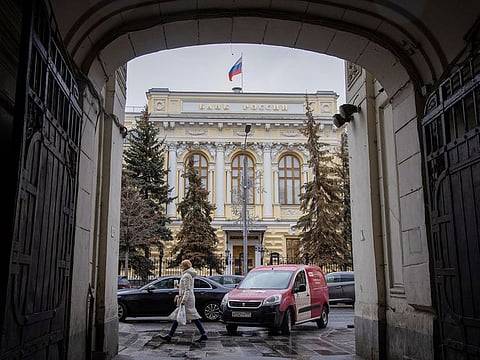Russia hikes interest rates to 20%, highest since 2003
It also temporarily banned brokers from selling securities held by foreigners

The Bank of Russia raised its key interest rate to the highest in almost two decades and imposed some controls on the flow of capital in a bid to shield the economy from the impact of sweeping Western sanctions that include penalties on the regulator itself.
The interest rate will increase from 9.5 per cent to 20 per cent, the central bank said in a statement before ruble trading was due to open at 10am local time. It also temporarily banned brokers from selling securities held by foreigners starting Monday on the Moscow Exchange, without specifying which securities the ban applies to. Authorities also introduced mandatory hard-currency revenues sales for exporters.
The emergency steps represent the most forceful measures taken by Russia after the latest round of sanctions, with the US and the EU agreeing to potentially block access to much of the $640 billion the country’s central bank has built up to protect the economy. Russia’s attack on Ukraine has spurred a flight from the nation’s markets, and the ruble was indicated 26 per cent weaker in offshore trading on Monday as market makers from Sydney to Hong Kong pulled back. It dropped 8 per cent at the open on the Moscow Exchange, immediately hitting the trading limit of 90 per dollar.
“Russian authorities have to prevent fire-sales of Russian securities to prevent panic,” said Commerzbank AG strategist Ulrich Leuchtmann. It’s “something which is certainly harmful in the long run, but which Russian authorities seem to prefer given the risk of an even more significant ruble collapse”.
S&P Global Ratings lowered Russia’s credit score below investment grade on Friday, while Moody’s Investors Service - which rates Russia one notch above junk - put the nation on review for a downgrade. Additional measures to exclude some Russian banks from the SWIFT messaging system could further choke up the country’s banking system and the central bank announced new steps on Monday to support lenders.
The restrictions will extend to transactions on the Moscow Exchange but won’t work elsewhere, including the American depositary receipt market, according to Norvik Bank PJSC’s Mikhail Kotlov. “That’s why there will be two markets,” he said on Twitter.



